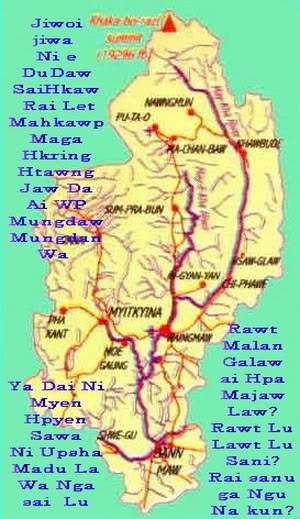]By WAI MOE
Following a month of relative quiet at the Sino-Burmese border while the military regime focused on election laws and the political situation in the country, attention turns once again to the border guard force (BGF) issue and the regime's attempts to bring the ethnic cease-fire groups under its command.
Naypyidaw's chief negotiator with the ethnic groups, Lt-Gen Ye Myint, is scheduled to meet on Thursday with an ethnic Wa delegation in Tangyan, a town in Shan State close to Wa territory, to discuss the military government's BGF proposal, according to sources close to the Wa.
The meeting is the first between the junta and the country's largest armed ethnic group, the United Wa State Army (UWSA), since February. At the previous meeting, Chinese officials, including commanders from the People’s Liberation Army, accompanied the Wa delegation, which was led by Bao Youxiang.
Ye Myint, who is also chief of Burma's Military Affairs Security, met on Sunday with representatives of the National Democratic Alliance Army (NDAA), known as the Mongla Group, a cease-fire group allied to the UWSA.
During the meeting, Ye Myint reportedly urged the NDAA delegation to respond positively to the BGF plan before April 22 or face repercussions by April 28. According to ethnic sources at the Sino-Burmese border, Ye Myint took a “tougher line” with the Mongla Group.
It is now one year since Naypyidaw proposed the BGF plan to various ethnic cease-fire groups. The Burmese government set the end of March as a further deadline, but has been unable to convince the main cease-fire groups in the region––the UWSA, the Mongla Group and the Kachin Independence Army––to agree to its terms.
According to sources, the regime leaders suspended negotiations with the ethnic groups for a month while they concentrated their efforts on the election laws and marginalizing the NLD, led by Nobel Peace Prize laureate Aung San Suu Kyi.
On March 28, just a few days after Suu Kyi announced that she did not support the NLD registering for the election, the junta resumed talks with the NDAA. The NLD announced its decision not to register for this year's election the following day, on March 29, after a meeting of its executive committee in Rangoon.
“It is clear that the junta has turned its attention back to the cease-fire groups now that it believes it has strategically checkmated the NLD,” said Aung Kyaw Zaw, a Burmese observer based on the Sino-Burmese border.
Meanwhile, Burma’s state-run media reported on Wednesday that Chinese Commerce Minister Chen Deming met Burma's Secretary-1 Gen Tin Aung Myint Oo in Naypyidaw on Tuesday though it did not report on the officials' agenda.
However, the Chinese delegation is expected to raise concerns about the Burmese regime’s growing tensions with the ethnic cease-fire groups along its border, as well as discussing bilateral economic ties.
Chinese Vice Commerce Minister Chen Jian visited Naypyidaw and spoke with Burmese Prime Minister Gen Thein Sein and Tin Aung Myint Oo on August 28 during the Burmese army’s siege of the town of Laogai, which is the headquarters of the armed ethnic Kokang group known as the Myanmar National Democratic Alliance Army.
The following day, hundreds of Kokang fighters opposed to the BGF plan crossed the Sino-Burmese border and handed over their arms to Chinese officials.
During the conflict, as many as 37,000 Kokang-Chinese villagers fled to China. Chinese businessmen lost an estimated Yuan 280 million (US $40 million) in property and trade losses during the conflict and China subsequently called for compensation.
Apr 2, 2010
Subscribe to:
Post Comments (Atom)
WUNPAWNG MUNGDAN SHANGLAWT HPUNG A NINGGAWN MUNGMASA
WUNPAWNG MUNGDAN SHANGLAWT HPUNG A NINGGAWN MUNGMASA
CHYE JU KABA SAI
Sa Du N'Gun Jaw La ai Majaw N'chying wa Chyeju Dum Ga ai,Yawng a Ntsa Wa Karai Kasang Kaw na N'Htum N'Wai ai Shaman Chye ju Tut e Hkam La Lu Nga mu Ga law




No comments:
Post a Comment